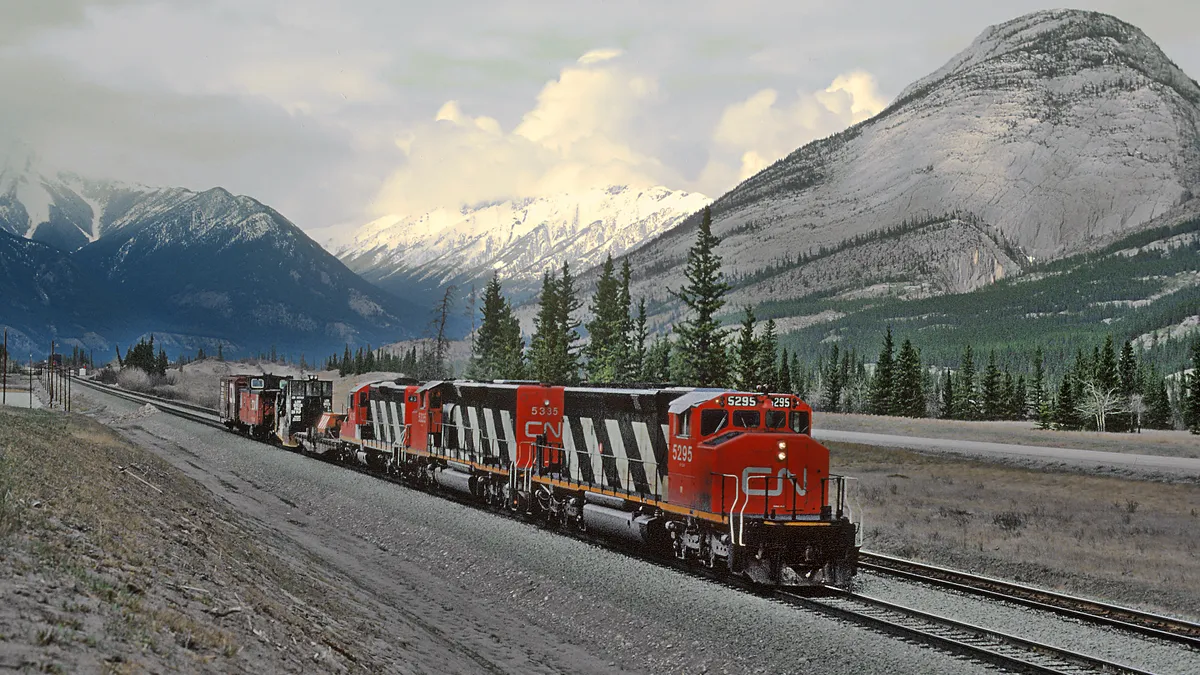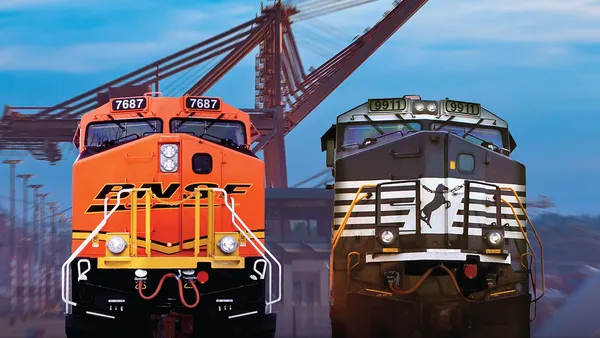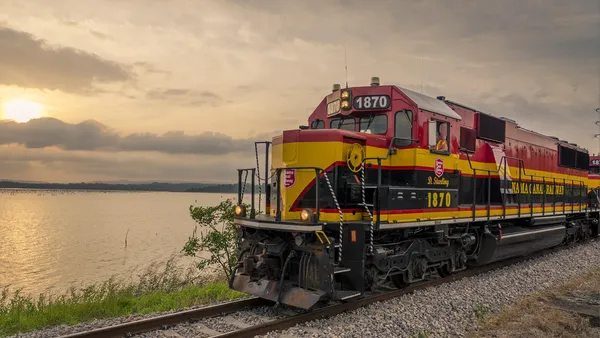Update: March 3, 2020: Candian National Railway has begun calling back hundreds of furloughed workers after pipeline protests blocked its Eastern network from operating since Feb. 14, the railroad announced in a press release Tuesday. A full recovery will take several weeks and the railroad is still monitoring the network for further disruptions, said CEO JJ Ruest in a statement.
“In Western Canada, for the last two weeks, we have been well on our way to recovering,” Ruest said. During the blockade, 1,400 freight and passenger trains were canceled according to Canadian National.
Dive Brief:
- Canadian police began arresting protestors east of Toronto Monday in an effort to break up a rail blockade, in place since Feb. 6, in opposition to a planned oil pipeline. Canadian National Railway furloughed 450 workers last week as a blockade of its eastern network continues. The railroad announced it would shut down part of its eastern network Jan. 11 and is now entering the third week of blocked operations.
- Competitor Canadian Pacific called for Prime Minister Justin Trudeau to meet with the protestors in a letter from CEO Keith Creel, describing the railroad as "severely impacted by the ongoing blockades across our rail network." A scheduled Monday meeting between the protestors' representatives and Trudeau is in limbo after the Prime Minister made comments about the blockade affecting Canada's economy, according to Global News.
- "We're reaching a point where there's a need for leadership ... because CN customers can no longer really put up with this for very much longer," said the railroad's CEO JJ Ruest at the Citi Global Industrials Conference in Miami Thursday. In the meantime, freight headed for Toronto and Chicago may have alternative routes available but Montreal is still inaccessible from the east, said the CEO.
Dive Insight:
As of Feb. 21, dwell times at the Port of Vancouver were three to five days at the dock for all CN containers and three to more than seven days for CP. Canada's Chamber of Shipping tweeted Friday there were no more anchorages for ships awaiting terminals at the port.
Montreal Gateway Terminals has declared Force Majeure at the Port of Montreal, meaning all inland freight must be evacuated from the terminal, according to an update from CMA CGM.
Ruest said Thursday the downtick in arrivals at Canada's eastern ports caused by the response to COVID-19 in China could help the railroad recover when the blockade eventually lifts, because it could mean a smaller backlog of freight. He said factories in Canada that rely heavily on rail are starting to feel the pain. After rail traffic fully resumes, it will take several weeks to return to normal operations, the CEO said.
Trucking spot rates in the U.S., sometimes affected by shifts in demand above the border, appear unaffected so far, said Charley Dehoney, CEO of Manning's Truck Brokerage in Omaha, Nebraska. DAT's spot loads posted were up 8.8% in the week ending Feb. 16, compared to the previous week. Flatbed load-to-truck ratio was up 16% week-over-week.
Dehoney told Supply Chain Dive spot rates in the Midwest and Northeast are relatively stable. "Even the Canadian carriers we talk to have told us they're working their routine freight without much disruption." He added that this time of year, there is enough capacity to handle spikes in demand short of a major upset.
The Canadian Trucking Alliance (CTA) called for an end to the blockades in a statement Tuesday, highlighting the multi-modal nature of modern supply chains.
"The supply chain is not only integrated from a supplier perspective, it’s integrated modally as well. When the railways suffer disruption in service, it impacts everyone in the economy including the trucking industry," reads a CTA new item.
Canadian Pacific's letter Thursday said blockades severed rail traffic to and from the Port of Vancouver, "the North American supply chain and the Canadian economy," and put some onus on the Prime Minister to end the dispute.
"The continuous and widespread disruption with no end in sight is creating critical safety and security concerns. CP supports the Wet'suwet'en in its request for dialogue with the Prime Minister. I call on you to engage immediately in a direct dialogue with the Wet'suwet'en Hereditary Chiefs," wrote Creel.
The letter was the first public release the railroad has formally made regarding the blockades. It is also the first formal mention by either railroad of the Wet'suwet'en Hereditary Chiefs, who lead the protest against the Coastal GasLink pipeline.















